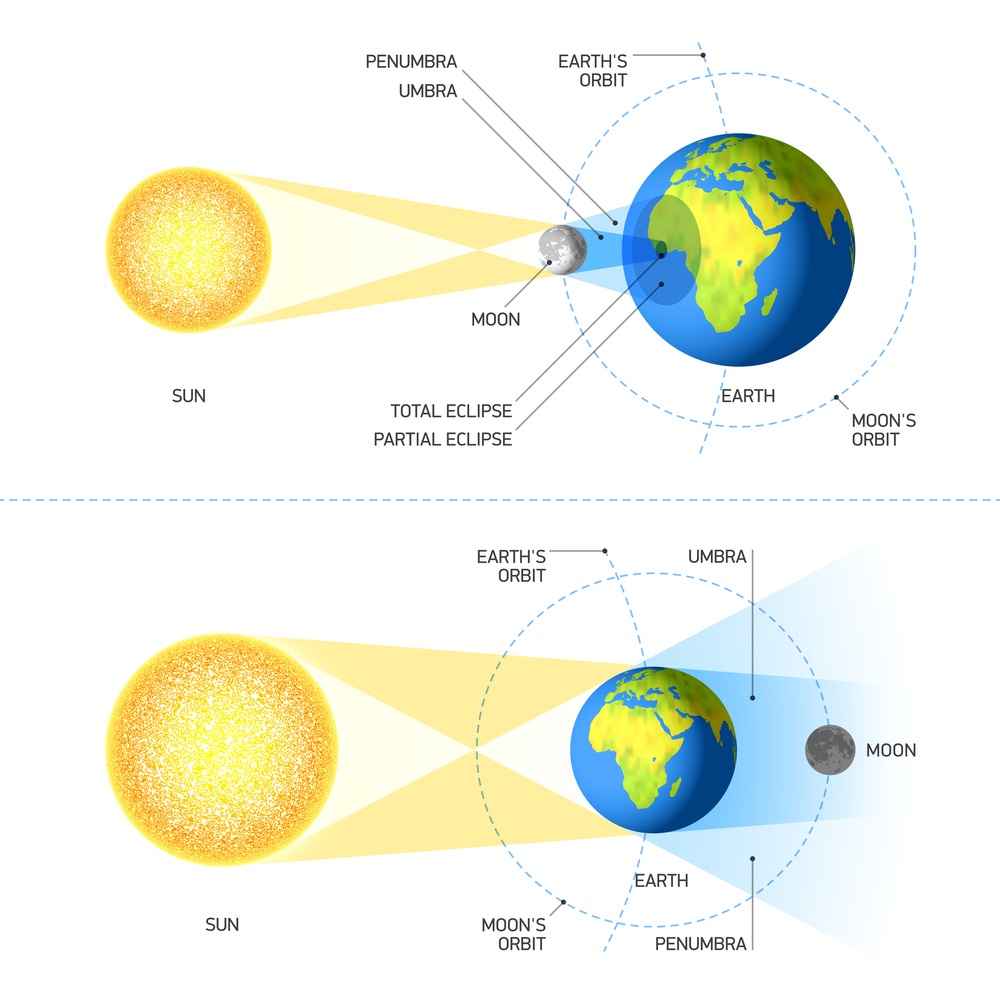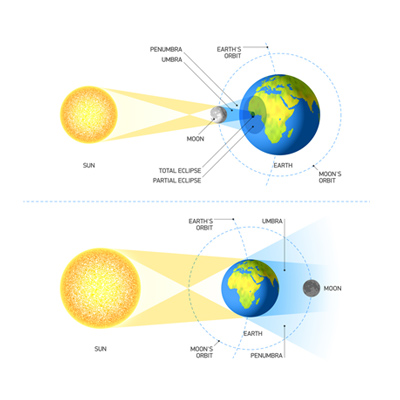

What does the field of astronomy tell us about eclipses?
Astronomy informs us that eclipses always occur in pairs; i.e., if there is a solar eclipse, then there will always be a lunar eclipse 2 weeks later (or vice versa).
- NOTE: Occasionally, there are 3 back-to-back eclipses, with each occurring 2 weeks apart. But that’s relatively rare.
A pair of eclipses occurs every 6 months. This means that we usually experience eclipse cycles 2 times a year.
- NOTES: (a) Occasionally there will be 3 eclipse cycles in one year, but again, that’s relatively rare. (b) Astrologically, we refer to these as “eclipse seasons.”
Astronomy also tells us that:
- Solar Eclipses always coincide with a New Moon.
- Lunar Eclipses always coincide with a Full Moon.
Astronomical explanation of a solar eclipse
This is when the Moon is located between the Sun and the Earth, which cuts off the light from the Sun.
NOTE: See top half of picture at the top of this Blog post.
Astronomical explanation of a lunar eclipse
This is when the Earth is located between the Sun and the Moon.
NOTES:
- See bottom half of picture at the top of this Blog post.
- The Moon has no light, but Earth’s position interrupts the reflection of the Sun’s light off the Moon.
Astrologically, what do eclipses generally represent?
NOTE: Because all eclipses occur when there is either a New Moon or Full Moon, I do recommend reading the following Blog post: New and Full Moons – How to Interpret Them Astrologically
- Whatever astrological influences are associated with a New Moon/solar eclipse or a Full Moon/lunar eclipse are believed to impact us the next 6 months (i.e., until the next eclipse season).
- The upside: This means we have extra time (i.e., 6 months) to let the issue(s) unfold.
- The downside: If it’s a difficult lesson, then we’ll be dealing with it for 6 months.
- Even eclipses impacts us for 6 months, at the time of the New Moon/solar eclipse or Full Moon/lunar eclipse, there may be a sudden surprise or “crisis” that catalyzes the changes that will unfold over 6 months.
- I always joke that an eclipse is a New Moon or Full Moon “on steroids.” It definitely amplifies the power and impact of the lunar event.
- Eclipses are almost always “wake-up calls” for what needs to change as our soul progresses to its next lesson(s).
- They activate the Moon’s Nodes (i.e., North Node, South Nodes).
- The house(s) activated by the New or Full Moon may indicate which area(s) of your life will need adjustments based on the placements of your natal North and South Nodes.
- The sign(s) involved in the New or Full Moon may help you know how the adjustments will take place.
- Any planets, asteroids, or Nodes that fall within 1⁰ of either side of the degree of the New or Full Moon will be impacted by that lunar event, and vice versa.
- A distance of greater than 1⁰ typically isn’t significant, although some astrologers will extend that to 2⁰ if it’s an eclipse that is close to the Sun.
- NOTE: More detailed information is provided in the following Blog post about how “close” a New or Full Moon needs to be in order to impact a natal planet, asteroid, or Node: How to Find the Transiting Moon in Your Natal Chart.
- Only the Ascendant and Midheaven are considered important with regard to an eclipse being located close to a house cusp.
- This is especially true with the Ascendant!
- The New or Full Moon needs to be located within 1⁰ of the Ascendant or Midheaven in order to be considered significant.
- All other house cusps aren’t considered to be important.
- NOTE: More detailed information is provided in the following Blog post about how “close” a New or Full Moon needs to be in order to impact a house cusp or angle (e.g., Ascendant, Midheaven): How to Find the Transiting Moon in Your Natal Chart.
Specific issues related to solar eclipses
Solar Eclipses often:
- Coincide with times when we see issues more clearly.
- Coincide with times when there is a new beginning or when decisions are made.
- Are more exciting than lunar eclipses.
Specific issues related to lunar eclipses
Lunar Eclipses often:
- Coincide with times when we see the truth.
- Coincide with endings or culmination points.
- Are more emotional than solar eclipses.

NOTE
- The content of this Blog post contains excerpts from Anne’s manual for her 10-part course Beginning Astrology: Understanding Yourself and Others!
RELATED LINKS
- Training and mentoring sessions with Anne
- Anne’s Astrology courses
- Anne’s Blog (including more posts about Astrological Information)
- Complete list of classes and workshops that are offered through IMPART
- Testimonials and reviews
- IMPART’s online Store
ADDITIONAL INFORMATION
- Be sure to Join Anne’s Online Community to receive:
- New & Full Moon Reports.
- Announcements about class offerings, new Blog posts, and new online products when they become available.
- If you have additional questions, feel free to email us at Anne@AnneReith.com or call (714) 599-0017.

Visit our Facebook page to receive Anne Reith’s daily inspirational quotes and announcements.
By Anne Reith, Ph.D.
